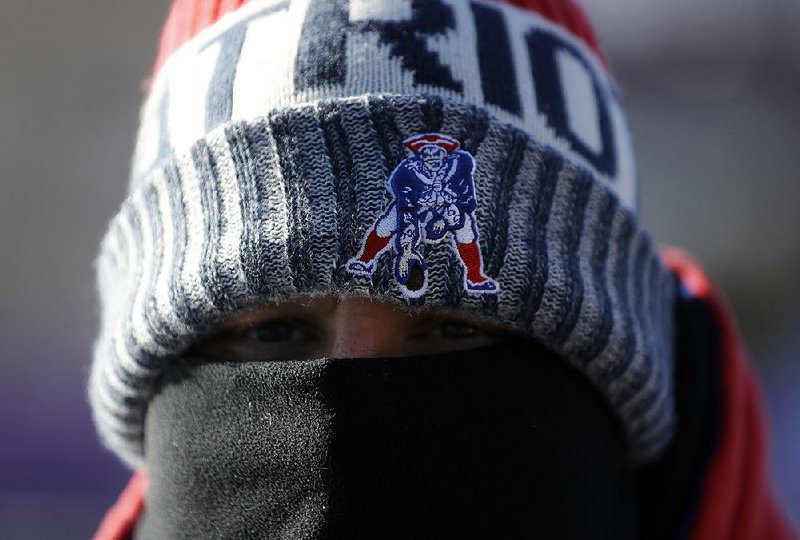MINNEAPOLIS — They billed Super Bowl LII as the “Bold North,” and it certainly lived up to those expectations. While the temperature outside U.S. Bank Stadium was a balmy 2 degrees at kickoff, it hovered at or below zero for most of the day with wind chills up to 25 below. That easily made it the coldest Super Bowl in history.
“A lot of people kept saying Super Bowl in February in Minnesota, this sounds like a terrible idea,” said Eric Dayton, a local entrepreneur who spearheaded the effort to bring the Super Bowl to Minneapolis. “Well, I think it is a great idea and it has been so fun to see all of these out-of-towners outdoors experiencing what we have to offer.”
For many, that meant waiting outdoors in dangerous conditions to clear the Level 1 security perimeter and enter the stadium. Most fans, though, were prepared for the elements. Some, it seemed, even enjoyed them. Fans were able to pose for pictures in front of the Super Bowl logo while holding a large thermometer to document the extent of their adventure. Inside, the temperature was a comfortable 70 degrees, although the glass windows behind either end zone allowed a glimpse of the chilliness and the snow that was piled up on the glass ceiling was a reminder of what awaited for the postgame departure.
Securing stuff
The NFL instituted expanded security measures for locker room access after the Super Bowl, not so much to protect the players but their equipment. Well, one player’s equipment at the very least.
A year after Tom Brady’s Super Bowl LI jersey was swiped during the postgame festivities (it eventually was recovered), credentials to enter the locker room at U.S. Bank Stadium included an RFID chip that had to be scanned.
Having reporters and others “tap in” and “tap out” with the technology allowed NFL security to keep better tabs on who was entering and leaving the space.
NFL chief security officer Cathy Lanier told ESPN that the league gave its security procedures an “extensive review” after last year’s embarrassment.
“The way we like to look at this is, we are doing every possible thing with cameras and technology to keep things secure all the way up to that locker room door,” Lanier said. “Then we rely on our partners from our clubs, and that would be the Patriots and the Eagles that are here, to make sure with everything that goes on inside that locker room, they keep safe.
“It has been an extensive review and extensive changes that we made, but as you know, even with credentialed people in a really tight security operation, there can be incidents. We’re hoping that does not happen this year.”
Brady will be taking his own precautions with his jersey.
“I’m taking it with me, man, if we win,” Brady said. “If we lose, I’m throwing it in the garbage.”
Broadcast flawed
The Super Bowl broadcast on NBC didn’t go off without a hitch.
The telecast went dark for several seconds Sunday night during a commercial break, prompting predictable confusion and frustration from viewers.
NBC Sports issued a statement on Twitter that attributed the darkness to a “brief equipment failure.” The network said no game action or commercial time was missed.
Complaints from the TV audience on social media included criticism of the audio quality during Justin Timberlake’s halftime show at cavernous U.S. Bank Stadium.
Morning wings
PYEONGCHANG, South Korea — At the Winter Olympics in South Korea, the Super Bowl was prime breakfast viewing.
With a buffet of wings and fries provided by the Olympic organizers — though with grape juice instead of beer — a few dozen journalists and staff watched the game in the media center this morning local time.
The crowd was about a 50-50 split between NFL fans from the U.S. and the rest of the world.
Not everyone knew the rules, but most were rooting for Philadelphia, whose touchdown late in the second quarter prompted raucous cheers.
Earlier in the second quarter, groans went up when the TV went out as the Patriots tried for a long completion on fourth and 5.
If you were not a die-hard Patriots fan, “you were going for the underdogs,” says Lachlan McKinnon, who works in media for the Australian Olympic Committee.
McKinnon follows Pittsburgh and the NFL’s Australian players from back home, so an early-morning Super Bowl is nothing new for him.
“I’m very much a fan of the spectacle,” he said. “Our time zone aligns with this, so we’re very used to watching early morning. The added benefit of chicken wings and chips here is nice as well.”
Park So-young, a volunteer working for the Olympic organizers, looked up the rules on her phone as the game progressed.
“I was curious about football. Heard it’s really famous in the USA,” she said. “It’s like when we watch a soccer game. They score, people scream.”
Just as in the U.S., the football isn’t always the main attraction of the big game. Park’s friend Lee Na-young, also a volunteer, admitted: “We came here for Justin Timberlake.”
Sports on 02/05/2018

